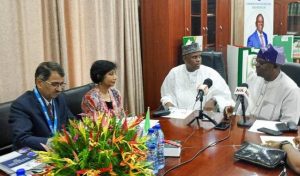The UN Children’s Fund (UNICEF) has identified a funding gap of $9.2 billion in the Water, Sanitation and Hygiene (WASH) sector in Nigeria.

Deputy Representative of Programme, UNICEF Nigeria, Dr Rownak Khan, made the disclosure when she visited the Minister of Water Resources and Sanitation, Prof. Joseph Utsev, and the Minister of State, Alhaji Bello Goronyo, in Abuja.
Khan said that, for Nigeria to achieve the roadmap for the WASH sector, the funding gaps must be closed, saying that tiers of government must do more by providing an enabling environment that would advance the cause.
According to her, working together to change the poor narrative will require new government financing at all levels, noting low water access and poor sanitation are affecting children the most.
She pledged UNICEF’s sustained partnership with the Federal Government to achieve the Campaign to End Open Defecation and Improve Access to Water Supply.
Addressing the delegation, the minister acknowledged the huge contributions of UNICEF to Nigeria’s growth and development in the areas of education, health, water and sanitation.
Utsev said that Nigeria would never underestimate the huge linkage between WASH, health promotion, economic growth and development, saying it would help promote inclusive development.
“UNICEF has done tremendously well in the areas of water and sanitation, nutrition and health and the impact is felt in all aspects.
“Nigerian government is also working in its programmes like WASH in schools, WASH in health and Youth WASH interventions,” he said.
Utsev assured UNICEF of Federal Government’s commitment towards improving the nation’s WASH sector, adding that government’s door was always open for more collaboration with development partners.
Minister of State for Water Resources and Sanitation, Goronyo, stressed the need for key stakeholders in the WASH sector to up their game in supporting the Federal Government to actualise the Renewed Hope Agenda of the present administration.
He said that partnership with the Federal Government would help achieve the campaign to end open defecation and improve access to water supply.
The meeting had in attendance the Permanent Secretary, Dame Didi Walson-Jack, and some directors in the Federal Ministry of Water Resources and Sanitation.
By Tosin Kolade
